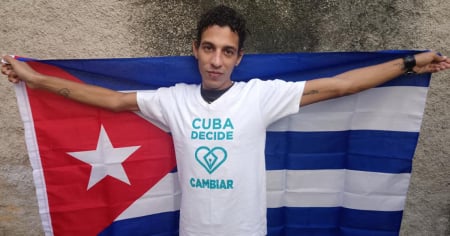Cuban activist Rosa María Payá, known for her fight for human rights and democracy in Cuba, issued a strong response to ruler Miguel Díaz-Canel following the government's announcement of a "March of the Fighting People" scheduled for this Friday, December 20.
Payá, the daughter of the late opposition leader Oswaldo Payá, used her social media to criticize the actions of the ruler, summarizing her message in a single word: "Leave."
"More than 800 protests in October, nearly 800 protests in November. Díaz-Canel, your march circus doesn't deceive anyone. You and your leaders not only sponsor terrorism; you exercise state terrorism against Cubans every day. Despite the repression, people continue to protest because to overcome the crisis, we must get away from you. March, yes, just get out!" said Payá.
Payá's words emerge within a context of growing social discontent on the island, characterized by economic crisis, blackouts, mass migration, and a strong repression against dissenting voices.
The march, promoted by the ruling leader, who in his speech filled with slogans repeated the usual accusations against the United States and justified the internal crisis by referring to the "criminal and genocidal blockade," aims to convey an apparent sense of unity and resistance among the population. However, it is known that the vast majority of attendees must participate out of obligation, faced with the possibility of unemployment or repression by the government.
The message "Leave," articulated by Payá, has echoed in recent days as a cry of frustration against a regime that is experiencing one of its most critical moments since the protests of July 11, 2021.
Alongside that phrase, a satirical theme has gone viral on social media. "Let Sandro go," attributed to the anonymous profile "Edmundo Dantés Junior" and created with Artificial Intelligence, has sparked laughter, reflections, and, above all, controversy regarding the privileges of the ruling class on the island, especially concerning the grandson of dictator Fidel Castro, Sandro Castro, who celebrated his birthday in style at a bar in Havana earlier this month.
Sandro, known not only for being a businessman and owner of the bar EFE, but also for his extravagant lifestyle, has become a symbol of the disconnect between the privileged elite and the Cuban people.
Frequently Asked Questions about Rosa María Payá's Response to Díaz-Canel and the Political Context in Cuba
What motivated Rosa María Payá's response to Díaz-Canel?
Activist Rosa María Payá responded to Cuban President Miguel Díaz-Canel following the announcement of a "March of the Fighting People" on December 20. Payá criticized the march as a propaganda act that fails to deceive the Cuban population, which continues to protest against the regime despite the repression. Her message, "Márchate" (Go Away), reflects the social discontent towards the Cuban government.
What does the phrase "Márchate," used by Rosa María Payá, symbolize?
The phrase "Márchate," used by Rosa María Payá, symbolizes the frustration and discontent of the Cuban people towards the Díaz-Canel regime. It is a call for the president's resignation as a means to address the political and economic crisis facing the country. This message has resonated widely among Cubans who are seeking change in the government's structure.
How has the Cuban population reacted to the call for the "March of the Combatant People"?
The Cuban population has reacted with indifference and rejection towards the "March of the Combatant People." A survey revealed that 72% of the participants would prefer to leave the country rather than attend the march, reflecting widespread discontent with the regime. Many see the march as an unnecessary propaganda act in the midst of a severe economic crisis.
What impact does the song "Que Vaya Sandro" have on the perception of the Cuban regime?
The song "Que Vaya Sandro" has become a symbol of criticism against the Cuban regime, satirizing the disconnect between the ruling elite and the people. The song highlights the inequalities and privileges of figures like Sandro Castro, the grandson of Fidel Castro, while reinforcing public discontent by illustrating the lack of real solutions to the country’s problems.
Filed under:
